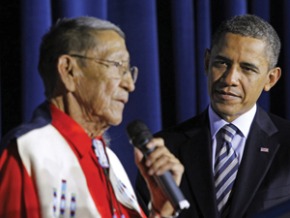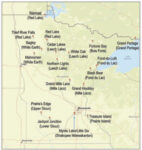
Holding the line on revenue sharing in tribal-state casino compacts and helping American Indian governments restore ancestral lands will continue to be priorities for the U.S. Department of Interior in President Barack Obama’s second term, current and former federal officials say.
DOI policy under Obama “is based upon principles that tribes must have an adequate land base to develop their economies,” says attorney Bryan Newland, policy adviser to Larry Echo Hawk, Obama’s initial appointee as assistant secretary for Indian affairs.
Newland, a citizen of Michigan’s Bay Mills Indian Community who left federal service to enter private practice, says DOI and its Bureau of Indian Affairs under Obama “operates on the belief tribes should exercise control over their own lands.”
Sovereign Land
So it was no surprise last October that Kevin Washburn’s first act as successor to Echo Hawk was to reject a draft compact between Massachusetts and the Mashpee Wampanoag that infringed on tribal authority and called for a 21.5 percent state share of casino revenues.
Washburn’s tribal gambling mantra for the next four years as head of the BIA is apparently written in the congressional intent of the Indian Gaming Regulatory Act of 1988.
Gambling under IGRA, according to the legislation, is to serve as “a means of promoting tribal economic development, self-sufficiency and strong tribal governments.”
That means the $27 billion that annually flows from 460 tribal casinos should not be onerously shared with states, counties and municipalities.
“Interior has an important role to play ensuring that gaming remains primarily a tribal asset,” says Washburn, an Oklahoma Chickasaw and former dean of the University of New Mexico School of Law.
It’s also crucial that tribal-state compacts not stray beyond the scope and regulation of gambling. The Mashpee agreement included hunting and fishing rights and other items that encroach on tribal jurisdiction over Indian lands.
“The law fairly strongly determines what can be negotiated between states and tribes,” Washburn says. “States should not be able to use gaming and a compact as a stalking horse to deal with tribal water rights, land claims and things of that nature. Congress did not authorize that. A compact is supposed to be primarily about gaming.”
Perhaps most important is Interior’s commitment to assist tribes seeking trust lands—not so much for gambling, but largely for infrastructure, homes, schools, clinics and economic development.
Unclogging a Bush administration moratorium on land/trust petitions, Interior in three years processed 1,041 applications involving nearly 100,000 acres. Eleven applications involved casinos.
Interior accomplished that goal despite constraints imposed by the U.S. Supreme Court’s 2009 decision in Carcieri v. Salazar, ruling Interior could not place land in trust for tribes not “under federal jurisdiction” with passage of the Indian Reorganization Act of 1934.
So Long Salazar
Much of the renewed federal focus on tribes began with Obama appointee Ken Salazar as Interior secretary.
And it hasn’t hurt that Obama has been the recipient of Indian largesse. Tribes contributed more than $2.5 million to the 2012 Obama campaign, according to the Center for Responsible Politics, far exceeding previous presidential elections. Republican Mitt Romney got $750,000.
Tribes made great strides in Obama’s first term. Along with land/trust and revenue sharing matters, the administration settled Cobell trust litigation, permanently reauthorized health care legislation, settled several water rights matters and streamlined the tribal land leasing process.
“I’ve never seen a commitment like this from an administration,” says Larry Rosenthal, partner in IETAN, a Washington government relations firm.
“Secretary Salazar will be remembered as one of the most forceful allies of Indian Country to have occupied the position,” Newland says.
Salazar is retiring, but tribes are hopeful Interior’s policy direction will continue under REI executive Sally Jewell, Obama’s nominee to fill Salazar’s seat. In any event, the DOI secretary normally relegates indigenous issues to the BIA, now headed by Washburn.
“NCAI welcomes the news that the Obama administration has moved quickly to nominate an innovative leader to continue the momentum of the Department of the Interior achieved under Secretary Salazar,” the National Congress of American Indians said in a statement.
“If the Senate confirms Miss Jewell we will be very excited to work with her,” Washburn says. “We’re specifically excited about her experience with Indian tribes.”
Haves And Have-Nots
The Bush administration land/trust logjam was alleviated when Salazar streamlined DOI’s administrative process, delegating final action on non-gaming applications to Interior’s eight regional offices.
“It was basically boring stuff that makes government work well,” Newland says of the administrative changes. “Sending stuff back out to the regional directors, revising the fee-to-trust handbook; there were some environmental review procedures that were rolled back.
“We put processing fee-to-trust applications in the performance standards for regional directors. We held them accountable for completing review of the applications.”
But failure to get a congressional fix to the Carcieri decision continues to pose hardships for the agency, requiring that trust applications undergo a legal analysis by Interior Solicitor Hilary Tompkins, a Navajo, or her regional counterparts.
Reviews surround the legal definition of “under federal jurisdiction.” Of 366 federal recognized tribes in the lower 48 states, about 50 received recognition after 1934.
“We have been careful to consider that issue with virtually every land-into-trust decision,” Washburn says. “At a minimum it means we’ve had analysis from the solicitor’s office, sometimes a full-blown opinion. Obviously it has added quite a bit of work to our solicitor.
“There are easy cases where everybody knows the tribe was under federal jurisdiction in 1934. And there are tribes where it is a little more complicated. We’re processing land into trust for some tribes and not at all for others.
“We think it’s a matter of simple justice, really, that every tribe has access. We are all equal and we all should have the right to restore our homelands.
“We don’t disapprove many of these. You won’t find a whole lot of decisions from us saying, ‘No, this is rejected because of the Carcieri analysis.’”
Washburn has also proposed eliminating a 30-day review on placing land in trust, a response to a Supreme Court ruling giving persons six years to legally contest land/trust actions.
Gambling Land/Trust
In rescinding the infamous Bush-era “commutability memo,” Salazar lifted what was essentially a moratorium on gambling land/trust applications.
The applications included not only existing tribes, but newly recognized, restored and landless tribes as well as federal land claims.
IGRA generally limits casinos to tribes recognized when the act was passed in 1988. Tribes seeking casinos on new lands off existing reservations are required to go through a “two-part determination” in Section 20 of the act.
The “two-part determination” requires approval from state governors and a discretionary—and often controversial—finding that the project benefits a tribe and is not “deemed detrimental” to nearby indigenous and non-Indian communities.
Salazar also demanded that the BIA move on “equal footing” exceptions for newly recognized and restored tribes not federally recognized when the act was passed and seeking gambling on “initial reservations.” There were also tribes acquiring land through claims against the federal government for lost acreage.
“These decisions often raise difficult and contentious issues among the parties involved,” Echo Hawk said when Salazar issued his directive.
Echo Hawk is a master of the understatement. Off-reservation gambling has generated opposition from states, local governments and even tribes angry that new casinos were encroaching on ancestral lands and casino markets.
Although “equal footing” applications do not require state approvals, environmental impact studies are extensive.
“Communities are affected by gaming operations,” Washburn says. “We certainly think the local voice is important, whether it be from the city, county or local community groups.”
There are 21 applications pending at Interior from tribes seeking land for casinos. Many off-reservation proposals have been resubmitted since Salazar rescinded the “commutability memo.” California and Oklahoma each have five of the applicants and Wisconsin has three.
“One area that has been very controversial, has generated much litigation, and could use some clarification, has been the process of placing off-reservation fee land into trust for the purpose of gaming,” writes Alexander Skibine, University of Utah law professor and onetime counsel to the House Committee on Interior and Insular Affairs.
“Unfortunately, much of this litigation has involved tribes against other tribes.”
Tribal Competition
Ancestral lands and potential encroachment are a part of Interior’s analysis of gambling on newly acquired lands. But in many cases the issue is competition.
“I wish all tribes would hold hands and sing ‘Kumbaya,’” Washburn says. “Each tribal leader has, I hope, an interest in looking out for the benefit of all tribes.
“But tribal leaders also have the responsibility—first and foremost—to protect their own communities, their market share and their ancestral lands.”
Expanded tribal gambling has generated opposition from such influential lawmakers as Majority Leader Harry Reid (D-Nevada), and Senators Dianne Feinstein (D-California) and John McCain (R-Arizona), the latter angry that a Tohono O’odham land claim threatens to bring off-reservation gambling to the Phoenix area.
Feinstein, McCain and others are demanding IGRA amendments to Section 20 exceptions. They blocked congressional efforts last year to remedy Carcieri, angering tribal leaders who contend the land/trust process is more about economic and social progress than gambling.
“Carcieri is really about tribes recovering and restoring our homelands. This is not about gaming,” says Ron Allen, chairman of the Jamestown S’Klallam Tribe and Washington Indian Gaming Association.
“My concern is Interior should treat all tribes equally,” says Allen, who also serves as treasurer for the National Congress of American Indians. “It currently doesn’t. To the credit of Interior and the BIA, they have moved the agenda forward with respect to the way the courts have interpreted Carcieri.”
The greatest victims of the controversy may be many of the 352 indigenous groups who since 1978 have sought official recognition, according to Interior’s Office of Federal Acknowledgment.
DOI and Congress have ruled on 73 of the cases, nine are under investigation, five are awaiting a judgment and five others are in litigation.
The lengthy, expensive and complex recognition process has been seriously muddled, with policymakers often suspicious that gambling is the motive behind the petitions. To be sure, many applicants are being financed by potential casino developers.
Generating nearly four times combined federal appropriations for the BIA ($2.54 billion) and Indian Health Service ($4.3 billion), gambling has hijacked federal Indian policy, complicating land/trust, labor and tax issues and delaying congressional action on health care, housing, law enforcement and, of course, Carcieri.
“Gaming is the big gorilla in the room in any discussion of Indian policy, which is sometimes a shame because gaming is not the most important activity that tribes do by any means,” Washburn told GamblingCompliance.com.
Putting The Kibosh On Revenue Sharing
In the 25 years since IGRA, tribes have often complained that states were engaging in extortion, demanding Indian governments share gambling revenues in exchange for tribal-state compacts required to operate Class III, Las Vegas-style casinos.
IGRA generally prohibits taxation of tribal casino revenues, but allows for exceptions if states give tribes a “benefit,” often statewide or regional exclusivity to operate casinos. Tribes have had little recourse as the 11th Amendment prevents tribes from suing states suspected of “bad faith” negotiations.
Of the 28 states with tribal casinos, 10 require some form of revenue sharing.
George Skibine, former head of the BIA Office of Indian Gaming, says proposed compacts with onerous revenue sharing components were often “deemed approved” during the Bush administration, meaning the agency took no action and allowed agreements to go into effect.
“There were a lot of deemed approvals,” Skibine says, under the guise that if the tribes and states agree to the compacts, “who are we to object?”
Perhaps the most blatant “extortion” of tribes was in California, where Governor Arnold Schwarzenegger (2003-2011) demanded Indian governments pay their “fair share” in helping alleviate a state deficit.
Sitting down with tribes to hash out new and renegotiated compacts, Schwarzenegger demanded general fund payments in exchange for allowing tribes to exceed a 2,000-slot machine limit in 1999 agreements. Fourteen tribes now pay $345 million a year to the general fund.
California tribal exclusivity, however, is vested not in compacts, but an amendment to the state constitution.
Unfortunately for Schwarzenegger, the state waived its 11th Amendment protections.
The Rincon Band of Luiseño Indians near San Diego last year won a nearly decade-long legal battle when the 9th Circuit Court of Appeals ruled Schwarzenegger acted in bad faith by demanding general fund payments in exchange for the additional slot machines.
The ruling, upheld when the U.S. Supreme Court refused to hear the matter on appeal, noted that the payments were in violation of IGRA tax prohibitions.
“Someone had to make the state own up to the fact its negotiations with tribes were illegal,” Rincon Chairman Bo Mazzetti says. “We fought this battle for all tribes.”
Newland says the Rincon decision “was a vindication of the standards that were already in place” when Echo Hawk rescinded the commutability memo.
Determining the revenue sharing value of statewide or regional exclusivity is now done “on a case-by-case basis,” Washburn says.
But Washburn, a former U.S. prosecutor and counsel to the National Indian Gambling Commission, has mixed emotions about federal involvement in compact negotiations.
“We try to give tribes and states the room to negotiate in a certain space and we will generally defer to their negotiations, at least until the state revenue share amount makes us gag,” he says.
“I personally haven’t been working on these decisions long enough to be able to state a real clear, bright line,” Washburn says. “In the end Indian gaming must primarily benefit tribes, not states or other outsiders.”
Although Washburn rejected the Mashpee compact (“We didn’t feel like we had a whole lot of choices there.”), he hopes in the future to encourage tribal/state partnerships on gambling issues.
“If the state and the tribe have worked hard together to come up with an agreement, it really does, sometimes, seem paternalistic to disapprove that agreement,” he say. It’s a beautiful thing when a tribe and a state can work through their difficulties and come up with an agreement.
“But we do have a law we have to follow.”










